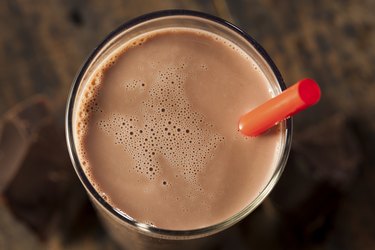
Chocolate milk is a favorite treat for many young children. As they grow older, that treat is sometimes altered into a protein shake for what they believe are stronger nutritional benefits. Some people however, leave chocolate milk just the way it is, thus spawning a comparison as to which of the two drinks has a higher nutritional value.
Calories
Video of the Day
Adults between the ages of 19 to 50 who have a sedentary lifestyle should eat between 1,800 and 2,400 calories a day, according to the U.S. Department of Agriculture. That means a quick snack such as a glass of chocolate milk or a protein shake should take up little of your daily caloric intake. One 8-ounce cup of chocolate milk contains about 200 calories, whereas a tall glass of 100 percent whey protein contains 120 calories.
Video of the Day
Protein
Protein is essential to human growth. Protein plays a major role in muscle development and bone development, and even makes up a large percentage of our bodies internal organs. The USDA recommends that adults eat or drink at least 0.4 gram of protein for every pound of body weight, every day. One serving of chocolate milk contains just 8 grams of protein, but the same size serving of 100 percent whey protein contains 24 grams of protein.
Fat
Fat typically makes up between 5 percent and 30 percent of our body mass. Professional athletes are usually in the single digits, above 30 is often a sign of obesity, and most others fall in between. What we eat and how much we exercise has a direct effect on how much fat our bodies store. When we run, swim, jog or walk, our bodies burn calories for fuel. As much as 57 percent of those calories come from fat, according to a 2009 study conducted at the University of St Thomas. A single serving of chocolate milk contains 5 grams of fat, of which 3 grams are saturated fat, compared to just 1 total gram of fat in 100 percent whey protein, of which just 0.5 grams is saturated.
Muscle Growth
When people lift weights, their muscle fibers tear. Immediately after this happens, the body sends satellite cells from between the plasma membrane and the basal lamina to repair the damage done. These satellite cells replicate at the damaged site and fuse onto the torn fibers, ultimately becoming one with them. Over a matter of days, the fibers heal completely, and the muscles return larger and stronger than before. This process is almost entirely driven by the amount of protein the body takes in post-exercise, thus making the 100 percent whey protein shake a much more effective muscle growth choice.
Verdict
While chocolate milk might not be bad for your health, it certainly fails in comparison to the health benefits offered by a whey protein shake. You won't do yourself too much harm by sipping a cold glass of chocolate milk on a hot day, but as a post-workout meal designed to help muscles recover and give your body the nutrients it desires, whey protein shakes are clearly dominant in this comparison.
- Whey Protein Institute: Whey Protein Benefits
- The Journal Of Nutrition: The Role of Leucine in Weight Loss Diets and Glucose Homeostasis
- My Fitness Pal: Calories in Nestle Nesquik Chocolate Milk
- Optimum Nutrition: 100% Whey Gold Standard
- National Heart, Lung and Blood Institute: Estimated Calorie Requirements
- University of St Thomas: Quantifying Differences in the "Fat Burning" Zone and the Aerobic Zone
- University of New Mexico: How Do Muscles Grow?